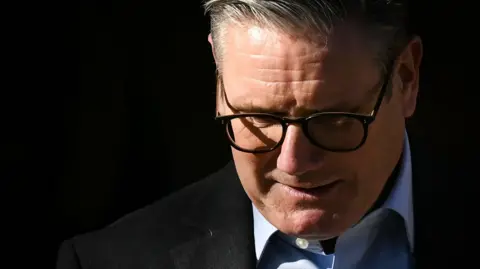 Getty Images
Getty ImagesEuropean Council President Antonio Costa says there is a “new positive energy” in the EU’s relationship with the UK.
President Trump says Sir Keir Starmer has been “very nice” and the pair are “getting along very well”.
The good vibes schtick has been rumbling for months between the UK and the European Union.
And what is billed by Downing Street as “the first UK-EU leaders’ summit” will take place in the UK on 19 May, it has been confirmed.
A similar good vibes schtick has been rumbling for a few months too between the UK and the United States.
And the prime minister is expected in Washington in the coming weeks.
Vibes only count for so much, but good ones are better than the alternative – especially after the years of bad blood over Brexit, and Donald Trump’s penchant for shouting his mouth off.
Sir Keir Starmer, the Remain campaigner who wanted a second EU referendum, now finds himself in possession of Brexit freedoms that give him choices – or dilemmas – over whether the UK tilts towards Washington or towards Brussels.
Can those good vibes in both directions be sustained?
Sir Keir has insisted to us that it isn’t an “either/or” choice, and under plenty of American presidents that would probably be the case.
But under President Trump, a Brexit-loving, EU-hating occupier of the Oval Office, something is likely to have to give at some point.
‘Prickly fish’
Downing Street will hope the cryptic but broadly positive noises from the White House keep coming, or at least don’t switch to the alternative, ahead of the prime minister’s trip to Washington expected soon.
As fellow European leaders put the boot in over all the tariff talk – Polish Prime Minister Donald Tusk called it “stupid” – Sir Keir was much more circumspect.
Meanwhile, the negotiations with Brussels trundle on.
The minister responsible for them, Nick Thomas-Symonds, rolled up in Brussels shortly after the prime minister, claiming the government will be a “ruthlessly pragmatic negotiator.”
“The European Union is the UK’s biggest trading partner, with trade totalling – in 2023 – over £800bn,” Thomas-Symonds pointed out.
“A study published last year showed that between 2021 and 2023, the goods EU businesses export to the UK were down by 32%, while UK goods exports to the EU were down by 27%.
“That is not good for British business or European businesses, especially at a time when our economies need a kickstart,” he added.
The government wants agreements on plant and animal health to remove barriers to agricultural and food trade, and a deal on the mutual recognition of professional qualifications.
How much of this is achievable?
One senior figure described the French as “prickly fish” in some of the discussions and said Germany was “effectively out of action” until after its general election later this month.
And what might President Trump make of it all, with some in the UK advocating a deeper trading relationship with America and the spectre of tariffs still hovering if the president feels piqued?
Polling trends
Here are two final straws in the wind to consider.
A poll by Ipsos suggests 47% of Britons say Europe is most important to Britain – the highest percentage saying this since the question was first asked in 2019.
This compares to 21% who say America.
Another poll, by YouGov, puts Reform UK – proud champions of Donald Trump and of Brexit – ahead of both the Conservatives and Labour for the first time.
The lead over Labour is within the margin of error, and the outcome of any single poll should be treated with some scepticism.
But trends in polls do matter, and the trend has been an upward one for Reform.
Its growth in support is something both the Conservatives and Labour are well aware of.
Put both polls together and everything else you’ve just read in the last few minutes and you can see that both the diplomatic and political room for manoeuvre for the government is limited.
And even those at the heart of the negotiations don’t know how things will actually turn out.
#Starmer #good #vibes



